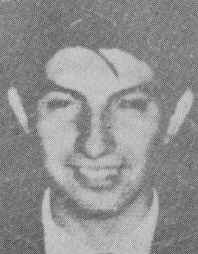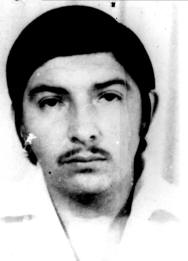NICOLAS HUGO VIVANCO HERRERA


Alicia de las Mercedes Herrera Benítez, 52
Hugo Ernesto Vivanco Vega, 58
Nicolás Hugo Vivanco Herrera, 30
Oscar Orlando Ramos Garrido, 58
Oscar Arturo Ramos Vivanco, 24
In 1988, Carmen Vivanco Mena whose husband, son, brother, sister-in-law and nephew ''disappeared'' following their detention in Santiago by the Dirección de Inteligencia Nacional (DINA), Directorate of National Intelligence, in August 1976 related her painful experience in an interview:
''I have lived alone since they disappeared: my family is the Association of Relatives of Disappeared Detainees.
It is tragic what has happened to me: not to know what happened to them, where they were taken to, at what moment while they were being tortured they would have needed a hand from their family. Nevertheless, my pain keeps me going, ready to fight in order that the same thing never happens to others.
I would like those responsible for so much suffering to go through just 15 days of what I have had to live through for years and years. These have been 12 years of suffering and I would like those responsible to go to jail for what they have done, because if not other governments will come along tomorrow and the drama will be repeated.
The terrible thing is not having the bodies, not being able to go to the cemetery to plant flowers. When someone dies in a confrontation, one cries, one suffers, but the body is there: we are just left with this open wound.
When I am alone in the house, I turn on the radio because they used to like listening to football. I make certain meals and think, ' my husband liked this dish so much'. It is painful being alone, but I have a great determination to discover the truth: it is a constant struggle in order that no one else will have to go through what we have been through ...
What happens to me and I think the same thing happens to my other friends at the association - I leave work, I get on a bus an14 November 2001d I see my son's face. My pain is great and permanent ... They were people, human beings ... when they took my husband and son away, they were in the workshop in my own home. So how can I find peace? We spend every day thinking of ways to find out about our relatives. It is a pain we feel everyday ...''(46)
The five who were members of the Communist Party, were connected with publishing and had worked at the Imprenta Horizonte where a number of party publications had been produced. At around midday on 4th August 1976, Hugo Ernesto Vivanco Vega who had gone out to buy some bread, was arrested in the street by DINA agents. He was bundled into a car and taken to the Villa Grimaldi. A witness to the arrest informed Hugo Vivanco's wife, Alicia de las Mercedes Herrera Benítez who was arrested a few hours later at her home. She had previously telephoned her son Nicolás Hugo Vivanco Herrera and gone to the home of her sister-in-law Carmen Vivanco Vega to inform them about her husband's arrest. On 5th August Oscar Orlando Ramos Garrido, a member of the central committee of the Communist Party and his son Oscar Arturo Ramos Vivanco were arrested by DINA agents and taken to the Villa Grimaldi where all trace of them was lost. On 10th August, Nicolás Hugo Vivanco Herrera, who had been trying to locate his parents, was arrested in the street.
All petitions on behalf of the five failed. The courts claimed there was no evidence that they were in detention and rejected the appeals made on their behalf. In 1978, a criminal complaint was presented by human rights lawyers against General Manuel Contreras, former director of the DINA, and other senior officials of the intelligence agency for their responsibility for the abduction and subsequent ''disappearance'' of 70 people, including the these five, between 1974 and 1976. The case was one of the most important legal actions to be taken on behalf of the ''disappeared'' and contained substantial material, including personal testimonies to back up the allegations of illegal arrests, torture and ''disappearances'' by the DINA. The DINA was formally under the authority of the military junta, but in practice, it reported solely to the orders of General Augusto Pinochet.
The complaint was originally presented to the 10th Criminal Court which declared itself without jurisdiction to continue with the case without carrying out any investigations whatsoever and passed the case to the military courts. The case was then closed pending new information. In 1983, the Military Appeals Court ruled to re-open the investigation of 35 of these cases but in November 1989 a military judge closed the proceedings on the basis of the 1978 Amnesty Law and because in the 10 years that the case had been open, it had not been possible ''to determine the responsibility of anybody'' ("determinar responsabilidad de persona alguna''). The decision was upheld by the Second Military Court on the grounds that "the penal responsibility of the people allegedly incriminated in the acts had expired" ("por encontrarse extinguida la responsabilidad penal de las personas presuntamente inculpadas en los hechos denunciados").
In 1990, the Supreme Court confirmed the closure of the cases, declaring the amnesty law to be constitutional.
The 70 cases in the original complaint were presented by human rights lawyers to the Inter-American Commission on Human Rights of the Organization of American States. In 1996 it concluded that the 1978 Amnesty Law violated the American Convention on Human Rights ratified by Chile in August 1990 and recommended the Chilean Government adapt internal legislation to conform to the ACHR so that the human rights violations of the military government can be investigated to identify those responsible and bring them to justice.
(46) "Vivo sola desde que desaparecieron: mi familia es la Agrupación de Familiares de Detenidos Desaparecidos
Lo que me ocurrió es trágico: no saber que pasó con ellos, donde se los llevaron, en que momento de la tortura habrán necesitado una mano de su familia. Sin embargo, ese dolor que siento me mantiene de pie para seguir luchando, para que no le suceda lo mismo a otras personas.
Me gustaría que los culpables de tanta tragedia sufrieran nada más que quince días lo que a mí me ha tocado vivir durante años. Para mí son doce años de sufrimiento y quiero que los responsables paguen con la cárcel lo que hicieron, porque si no el día de mañana vendrán otros gobiernos y el drama se repitirá. Lo terrible es no tener los cadáveres, no poder ir al cementerio a colocarles una flor. Cuando alguien muere en un enfrentamiento se llora, se sufre, pero está el cuerpo: nosotros siempre estamos con una herida abierta.
Cuando estoy sola en la casa coloco la radio porque a ellos les gustaba escuchar fútbol. Hago ciertas comidas y pienso, ‘ pero tanto que le gustaba a mi marido’. Es angustioso estar sola, pero tengo una tremenda fuerza de voluntad por saber la verdad: es una lucha constante para que nadie viva lo que nosotros hemos vivido ...
A mí, y creo que todas las compañeras de la Agrupación nos pasa lo mismo - salgo del trabajo, voy en una micro y veo la cara de mi hijo. Mi dolor es grande y permanente ... Eran personas, seres humanos ... cuando se llevaron a mi esposo y a mi hijo, estaban en el taller de trabajo de mi propia casa. Entonces, cómo puedo yo tener tranquilidad? Todos los días una está pensando qué hacer para saber de nuestras familiares. Es una angustia de todos los días."
Source; Amnesty International – Document: AI Index: AMR 22/014/2001 dated 10 December 2001 – Titled ; CHILE - Testament to suffering and courage: the long quest for justice and truth